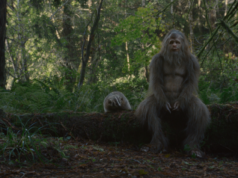What does it mean that all the actors who have played Willy Wonka on screen have been Americans? You might not have tabbed Timothée Chalamet as the latest one after seeing Dune, but any 30 seconds of his sly, bright, high-keyed performance in Wonka will show you how right he is for the role. As for the movie he’s in, which serves as a prequel to the Roald Dahl stories about the fabled candyman, it doesn’t always work, but Chalamet is more than good enough to carry it through its wobblier patches.
The story begins with Willy arriving in some city that’s a mashup of London, Paris, and Vienna to make his fortune as a chocolatier. He gets off to a rocky start, as he’s turned into an indentured servant by a crooked landlady (Olivia Colman) and frozen out of the sweets industry by a cartel of evil candymakers (Paterson Joseph, Mathew Baynton, and Matt Lucas). The cartel enforces their monopoly by bribing the chief of police (Keegan-Michael Key) with chocolate, and as the movie goes on, the top cop grows heavier and heavier. Wonka is undeterred, and with the help of a cute kid (Calah Lane) and their fellow servants, he plans to open his own shop and show the world who’s the best chocolate man in town.
This is in the hands of Paul King, who’s best known for helming the Paddington movies. He may not bring the craftsmanship that Tim Burton did to his version of Charlie and the Chocolate Factory, but he does bring a lightness of touch that fits the material. The subplot with Wonka trying to honor the memory of his late mother (Sally Hawkins) works upon the main plot without becoming intolerable. The biggest potential pitfall here is the Oompa-Loompa (Hugh Grant) who follows Wonka around and steals his chocolate. Turns out the 8-inch-tall orange fellow is only taking back what belongs to his people, since Willy harvested the last cacao beans in Loompaland without considering the natives. The Oompa-Loompas are such problematic creations on so many levels, and this is as dexterous a handling of them as I could have reasonably expected.
If none of the supporting players here delivers as memorable a performance as Grant did in Paddington 2, the film does have enough comic scenes to keep it going, like when Willy delivers a bonbon to a security guard (Simon Farnaby, who also co-wrote the script here) and then watches the guy become progressively bombed because the little piece of chocolate contains so much alcohol.
Songwriters King, Farnaby, and Neil Hannon come up with an impressive number of rhymes for the word “chocolate.” Their original songs are mostly pleasant, but at one point they do better than that. It’s when Wonka finally opens his own chocolate shop and welcomes in his first customers by dancing down a ruby chocolate walkway lined with blooming chocolate flowers and singing “A World of Your Own.” This is where the elements in the film — Nathan Crowley’s production design, Chung Chung-hoon’s photography, the music, King’s direction, and Chalamet’s performance — all come together and create something truly wonderful. This movie retains two of the Leslie Bricusse/Anthony Newley songs from the 1971 movie, and Chalamet’s ringing rendition of “Pure Imagination” over the film’s ending is so great that it makes that tediously overexposed song sound newly uplifting. It’s when the movie sings, and when the star is singing, that Wonka feels worthy of a golden ticket.
Wonka
Starring Timothée Chalamet and Calah Lane. Directed by Paul King. Written by Simon Farnaby and Paul King. Rated PG.











